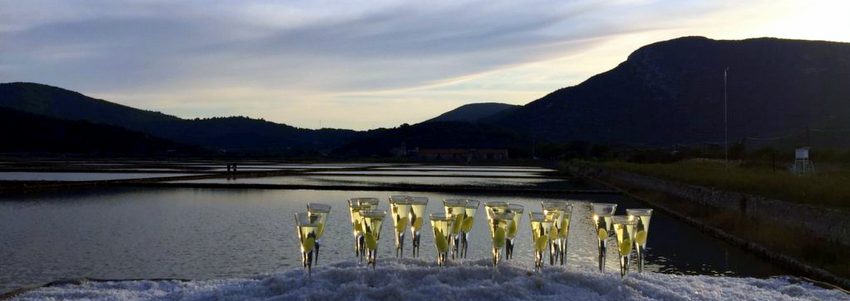Croatian standard fare is similar to many other central European or Mediterranean countries (pizza, pasta, meat dishes, fish). All food is safe to eat as restaurants are regularly inspected, and there is no problem with drinking water. Unsurprisingly, seafood is a specialty along the Croatian coastline and the islands.
Breakfast
Hotel breakfasts generally include coffee, tea, bread, butter, jam, paté, cheese, and ham. We try to ensure that our hotels provide a substantial breakfast for cycling, and so ask them to include fruit, cereal, milk and maybe yogurt. If you are on your own and need more sustenance, you can always go to the supermarket to buy yogurt or cheese.
Snacks
You can also find good snacks and pastries at Slasticarna, small pastry shops. Look for apple, cheese or cherry strudel, “Croatian” donuts with a bit of marmalade inside, Chocolate donuts, or Pasta, a cream-based pastry.
Lunch and Dinner
For quick lunches on the road, you can go to a Pekara (bakery) and try Burek, a savory pastry filled with cheese or meat and often eaten as a “fast food” item. It may also be eaten with yogurt and is made of thin dough layers that are stuffed and then rolled and cut into spirals. Another famous fast food item in Croatia is Cevapcici. Originally from Bosnia, this is a delicious dish of grilled minced meat, found in the countries of the Former Yugoslavia. Cevapcici may be served on a plate or in a flatbread sandwich (then called a lepinja), often with chopped onions, a local type of sour cream (kajmak), a relish made of bell peppers, eggplant, chili and garlic (ajvar) cottage cheese, and so on.
For sit-down meals at dinner or lunch you can go to fancier restaurants or to the local pub/eatery, the Konoba. Konobas generally have traditionally prepared dishes, made with natural home-grown ingredients and served in pleasant local surroundings. Service may be lower quality than in restaurants, but it is an authentic meal.
Drinks
Croatian beers are top quality. Try Zagreb’s Ozujsko pivo or Karlovacko pivo or Tuborg, brewed under license in Croatia. In Dalmatia, some red wines such as Faros or Dingac are exquisite. You’ll encounter homemade wine for sale or to drink since grapes are grown in most places. You should also try Croatia’s favorite brandy sljivovica, made from plums, or travarica, an herbal brandy.
Coffee
In Dalmatia, coffee drinking is an important morning ritual. You’ll see people out at cafés drinking coffee and watching the world go by. During weekends, sitting by the waterfront drinking coffee, chatting and gossiping, and people-watching is a popular past-time. Cafe bars will be filled with locals doing just that. Most people drink a large coffee with milk (velika kava s mlijekom; pronounced: velika kava mleeyeko) or you could also order a kava obična (pronounced: kava obichna) which is a simple coffee without milk—just an espresso.


